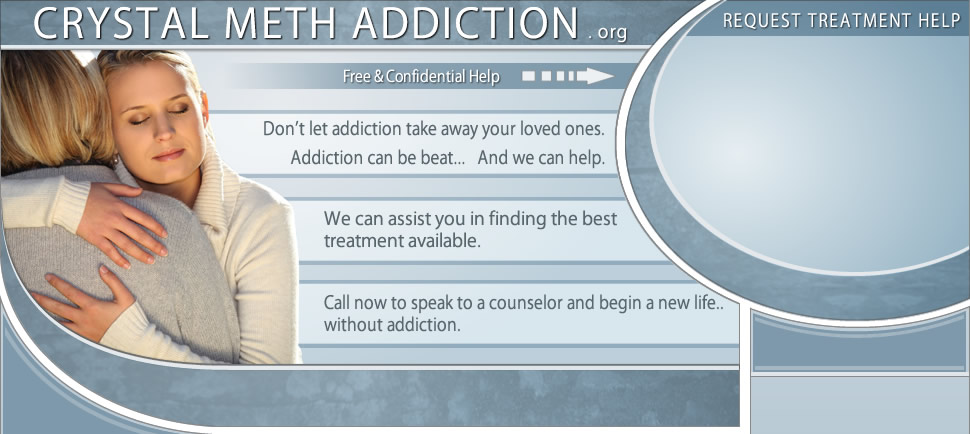Meth Intervention
A meth intervention can be among one of the toughest meetings to conduct because of the meth addicts propensity towards unpredictable, and often times violent behavior. Individuals who become addicted to meth will often go on binges, where they will use huge amounts of the drug for several days in a row. After a meth binge is over, it is extremely common for a meth addict to begin to express deep remorse and for them to swear on everything that is sacred to them that they will never use the stimulant again; unfortunately, loved ones will often delay a scheduled meth intervention, and take the person with the meth addiction at their word. The fact of the matter is that every time the person binges on meth, it only strengthens their addiction to the toxic stimulant.
Timing is everything, in relation to conducting an effective meth intervention process. For the best results, loved ones should plan a meth intervention within several weeks of the last binge; thus, the meth addict could still be feeling some level of remorse about the recent troubling incident. On the other hand, staging a meth intervention too soon after a binge could be asking for trouble, as the meth addict may still be in a manic state; at this point, the chances of the meth addict agreeing to get help are very slim. For this reason, loved ones should go to great lengths to be sure that a professional intervention specialist is present to lead the meth intervention process. Because this person has been trained in regard to what is the safest and most effective time to conduct a meth intervention, the life-saving meeting is likely to have a much higher likelihood of being successful.
A meth intervention is best handled with the aid of a professional intervention specialist; having an unbiased interventionist available to guide loved ones through the staging process, can often be an invaluable experience, and many times will actually be primary reason that the addict will accept the help that they are so desperately in need of. An experienced interventionist can gently guide the addict's family members and friends through the delicate staging process, with a minimal level of anxiety, by helping them to know what to expect on the day of the meeting. In some instances, it is vital that an unbiased professional be called upon, for the best possible chance of a successful intervention conclusion.
Listed below are several of the situations in which hiring a professional interventionist to conduct a meth intervention is highly recommended;
-
An intervention specialist should lead a meth intervention when loved ones and co-workers have asked the meth addict repeatedly to seek drug treatment, and they have only been met with denial and false promises.
-
An interventionist should be summoned immediately, when the meth addict begins to act in dangerous and destructive ways and begins to steal to feed their addiction; it is at this stage in a meth addiction that the user could potentially get into trouble with the law that could affect them for the rest of their lives or that they could potentially do harm to themselves or to the people that are close to them.
When a professional interventionist is not able to be on hand, the first step for loved ones to take is to identify who will be present on the day of the meth intervention; the people that are selected to make up the meth intervention team should be loved ones who have steadily maintained a close relationship with the individual who is being intervened upon. Every person that chooses to be a part of this meeting must be willing to share openly with the addict about their personal experiences in relation to their meth addiction problem. The most difficult part of delivering this vital message may lie in having to present it in a calm and loving manner; unfortunately, this is not optional, as delivering such information in an angry and judgmental way could only serve to contaminate the entire meth intervention process.
Before the formal meth intervention is held, family members should come together to select the drug rehab program that would best suit the addict and begin the process of making all of the necessary arrangements; thus, the person who is being intervened upon will be able to leave for the drug treatment center immediately upon the conclusion of the meeting .The individual who has been chosen by the group to lead the intervention should be the person that keeps in touch with the drug treatment center in order to keep them posted about the outcome of the meth intervention.
A pre-intervention meeting should be conducted with all of the people who wish to be present on the day of the meth intervention. If an intervention specialists is not available, the person who has been chosen to lead the group should tend to all of the specific meth intervention details at this time; these details may include the order in which the people who are present will speak to the addict, who will be responsible for getting the addict to the meth intervention, and where loved ones will park, so that the person being intervened upon will not recognize their vehicle. The element of surprise, particularly in relation to a meth intervention, could be vital; given the level of paranoia that is so commonly associated with meth use, there is little chance that the person would show up if they know that a group of people were waiting to whisk them off to a place that they are not familiar with for treatment.
Upon the conclusion of the meth intervention process, if the meth addict refuses to accept the treatment that has been offered to them, every person that is present should take a turn to clearly communicate what the consequences of refusing this treatment will be. When the meth intervention has convened, the family should immediately seek the assistance of a professional interventionist to help them to stage another meeting at the earliest available time.

